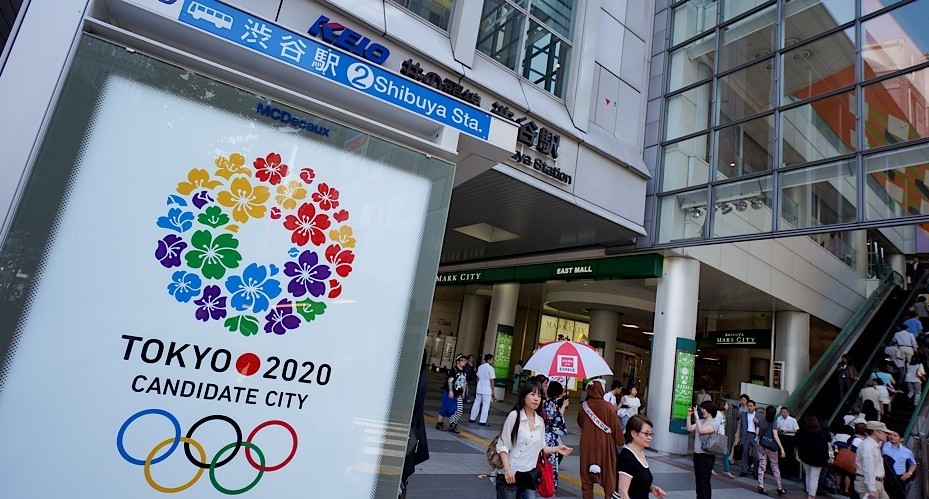The coronavirus pandemic has seen many events either postponed or cancelled. The most globally known event by far would be the 2020 Summer Olympics in Tokyo which was originally scheduled from 22 July to 9 August.
The global sporting event is now rescheduled to be held from 23 July to 8 August 2021 instead, but will still retain the name as the Olympic Games Tokyo 2020. Despite general worry from the Japanese population on the pandemic and its aftereffects, The International Olympic Committee (IOC) has announced that there is no “Plan B” and that the games will go ahead as planned. Around 206 National Olympic Committees are scheduled to participate and approximately 11,091 athletes in various sporting games are expected to compete. The choice for the organizer to carry out this event is being met with declining support from the general population over renewed concern of a new strain of the coronavirus. Japan will only begin its vaccination program late February (as of the date of this article, Japan has begun local clinical trials with the Moderna vaccine in January). Many believe vaccination of its 127 million citizens is crucial for the game to take place. A massive $14 billion has been set aside by the government to roll out the vaccine before the games begin, despite growing uncertainty amongst a population which has a history of being deeply wary of vaccines.
A question remains, why is the Japanese government planning to go ahead with its plan to host these Olympic games amidst the threat of the pandemic?
Surely, a potential Plan B would be to cancel it all together? In the Olympics history, the games have been cancelled three times before, in 1916, 1940 and 1944. In fact in 1940, both the summer and winter Olympics were scheduled to take place in Japan but were cancelled due to WW2.
Too far gone
Hosting an Olympic is a big deal for any country, but it also carries huge financial implications. Going ahead with it is a way to recoup the investment that Japanese government and its public sponsors have spent on the games. Japan reportedly spent $75 million for the campaign to host the games and provided a $7.3 billion budget during its bidding in 2013. The coronavirus delay reportedly cost around $2.4 billion, and since then the Tokyo organizing committee has upped the outlays to $15.4 billion. It is now set to be the most expensive summer Olympics. So, the show must go on as the IOC depends on selling broadcasting rights and sponsorships which accounts for 90 percent of its revenue. Note, that this game could go ahead without the anticipated spectators that would bring additional income through ticket sales. It was reported that around 70 percent of tickets are reserved for buyers in Japan and sales are expected to be worth $800 million to local organizers. The remainder is reserved for overseas visitors, who may not be able to travel if the pandemic’s infection numbers continue to rise.
Postponing the game further would also jeopardize plans for the 2024 Olympic games to be held in Paris. A few reasons put forward by IOC President, Tomas Bach was that they simply cannot have overlapping games one after another, the next Olympic game scheduled, the Beijing Winter Olympics in February 2022, is only 6 months away, neither can the committee keep employing the 3,000 – 5,000 people for an indefinite time. If Tokyo Olympics 2020 does not go ahead this year, it could lead to the games taking place further along in 2024, Paris will be 2028 and LA in 2032.
The proud nation
Tokyo Governor, Yuriko Koike has a vision for Tokyo and is betting on Hong Kong’s losing appeal after Chinese crackdowns and Singapore becoming more expensive for investment, that Tokyo will win back some of its former glory as a regional hub for foreign companies in Asia. The Tokyo metropolitan government has launched marketing campaigns, particularly aimed at high-tech and fintech firms, and the Olympics are an excellent chance to highlight the city.
There is also a sense of pride in reliving the 1964 Tokyo Olympics in which Japan gained fame for showcasing to the world how the country recovered from the devastation of the WW2 less than two decades later and how it reformed from an aggressive empire-seeker to a model of peace and democracy. It still craves to showcase the glory of the ’64 successful event, and what better way to reclaim the fame than by hosting the very event that demonstrates the best of Japan and help the world celebrate as it turns the corner on the Covid-19 pandemic.
Forfeiting the games is not an option, as the world’s next global sporting event will be the Beijing Winter Olympics 2022. In the realm of Asian rivalry, this is one that Japan would not want to see itself losing. Japan was the 2nd largest economy after the US from 1968 to 2010, before losing the spot to China, and a few billion dollars to make the games happen may be a small price to pay for a chance at glory.
At this point, pulling off the Olympics is not just a matter of economic damage-control. It is a national project, a matter of honour and saving face from being seen as a nation of give-ins.

The Playbook
The IOC announced on February 3 that the game would take place and have issued the Tokyo Olympic playbooks meant to outline measures against Covid-19. Some of the actions-in-plan from the playbook which aims to keep participants and citizens of Japan safe are:
- A vaccination will not be compulsory for those attending the games, although a negative test for Covid-19 is required four weeks leading up to the event and athletes will be tested every four days.
- Those coming to the games will be asked to cheer by clapping instead of chanting or shouting.
- Athletes, and those attending the games will not be permitted to visit tourist sites or travel on public transport.
- A 14-day activity plan is to be submitted ahead by those attending.
In addition to the above, plans are in place to keep strict attendance numbers in the opening ceremony on July 23. Athletes cannot check into the Olympic Village more than five days before the opening and must leave two days after finishing their competition.
Despite all the measures in place, will it be enough to not turn the Olympic Games Tokyo into the “mother of all super-spreader events”?
Certainly, the Tokyo Olympics will be very different from what we are all used to in the past, with a stadium full of spectators cheering and waving their nations’ flag and will be without the grandeur of the opening and closing ceremonies. The IOC have stressed the focus is to host a sporting event without the extravagant hoopla that has become a part of the Olympics. For a while now, the Olympics have been known to cause economic strain to the country that hosts them. Some past examples: Athens spent $15 billion to host the 2004 Olympics, taxpayers in Athens will continue to be assessed annually until the debt is paid and most of the facilities built during the games remain empty. In a nearly similar example of another endemic, the 2016 Olympic in Brazil was affected due to the Zika virus. Extra accommodation was built for the expectation of tourists; however, the virus scares saw the decline in tourists expected during the Games.
While Tokyoites and the rest of the world are Covid-weary, and despite the budget to host the Games having risen, the IOC is still head-on strong to proceed with the Olympics 2020, even if it could mean less spectators and a potential loss in income. The Olympics history has showcased a few past examples as to how the games have caused economic strain to its host country and perhaps the Tokyo Olympic 2020 Games can serve as an inspiration for future Olympics Games and other countries to look for alternative, more cost effective and sustainable ways of hosting.
Note: All currency is in US$
Related articles:
A Volunteer’s View of the Rio Olympics
Photo credits:
Tokyo Tower Special Lightup by t-mizo (CC BY 2.0)
Tokyo Olympics 2020 by Danny Choo on Flickr (CC BY-NC-SA 2.0)








